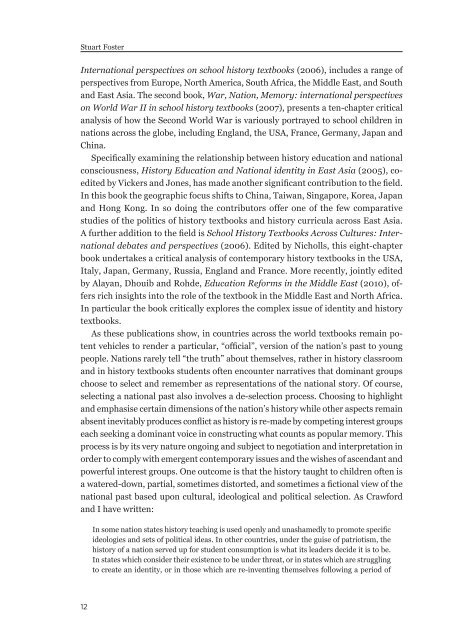Download issue - Umeå universitet
Download issue - Umeå universitet
Download issue - Umeå universitet
You also want an ePaper? Increase the reach of your titles
YUMPU automatically turns print PDFs into web optimized ePapers that Google loves.
Stuart Foster<br />
International perspectives on school history textbooks (2006), includes a range of<br />
perspectives from Europe, North America, South Africa, the Middle East, and South<br />
and East Asia. The second book, War, Nation, Memory: international perspectives<br />
on World War II in school history textbooks (2007), presents a ten-chapter critical<br />
analysis of how the Second World War is variously portrayed to school children in<br />
nations across the globe, including England, the USA, France, Germany, Japan and<br />
China.<br />
Specifically examining the relationship between history education and national<br />
consciousness, History Education and National identity in East Asia (2005), coedited<br />
by Vickers and Jones, has made another significant contribution to the field.<br />
In this book the geographic focus shifts to China, Taiwan, Singapore, Korea, Japan<br />
and Hong Kong. In so doing the contributors offer one of the few comparative<br />
studies of the politics of history textbooks and history curricula across East Asia.<br />
A further addition to the field is School History Textbooks Across Cultures: International<br />
debates and perspectives (2006). Edited by Nicholls, this eight-chapter<br />
book undertakes a critical analysis of contemporary history textbooks in the USA,<br />
Italy, Japan, Germany, Russia, England and France. More recently, jointly edited<br />
by Alayan, Dhouib and Rohde, Education Reforms in the Middle East (2010), offers<br />
rich insights into the role of the textbook in the Middle East and North Africa.<br />
In particular the book critically explores the complex <strong>issue</strong> of identity and history<br />
textbooks.<br />
As these publications show, in countries across the world textbooks remain potent<br />
vehicles to render a particular, “official”, version of the nation’s past to young<br />
people. Nations rarely tell “the truth” about themselves, rather in history classroom<br />
and in history textbooks students often encounter narratives that dominant groups<br />
choose to select and remember as representations of the national story. Of course,<br />
selecting a national past also involves a de-selection process. Choosing to highlight<br />
and emphasise certain dimensions of the nation’s history while other aspects remain<br />
absent inevitably produces conflict as history is re-made by competing interest groups<br />
each seeking a dominant voice in constructing what counts as popular memory. This<br />
process is by its very nature ongoing and subject to negotiation and interpretation in<br />
order to comply with emergent contemporary <strong>issue</strong>s and the wishes of ascendant and<br />
powerful interest groups. One outcome is that the history taught to children often is<br />
a watered-down, partial, sometimes distorted, and sometimes a fictional view of the<br />
national past based upon cultural, ideological and political selection. As Crawford<br />
and I have written:<br />
In some nation states history teaching is used openly and unashamedly to promote specific<br />
ideologies and sets of political ideas. In other countries, under the guise of patriotism, the<br />
history of a nation served up for student consumption is what its leaders decide it is to be.<br />
In states which consider their existence to be under threat, or in states which are struggling<br />
to create an identity, or in those which are re-inventing themselves following a period of<br />
12

















